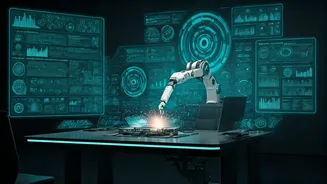AI’s Transforming Role
Artificial Intelligence is not simply a replacement for human workers; it is a catalyst for change, fundamentally altering the nature of work. The core
argument suggests that AI is shifting the focus from routine tasks to roles that demand uniquely human skills. Instead of fearing job losses, people should view AI as a tool that demands adaptability and a willingness to learn new skills. This shift means that the jobs of the future will require a different set of competencies. The emphasis is on embracing continuous learning and developing the skills that complement AI. Specifically, those who adapt by acquiring skills in areas like critical thinking, creativity, and complex problem-solving will be in high demand. The narrative encourages a proactive approach towards upskilling and reskilling to remain competitive in a landscape driven by AI advancements.
Value in the Future
The evolving job market places a premium on qualities that are inherently human. Skills that involve critical thinking, innovation, and emotional intelligence will become increasingly valuable. These capabilities are difficult for AI to replicate, which will make them crucial differentiators in a world where AI handles many operational and analytical tasks. The emphasis shifts to roles that leverage human creativity, strategic thinking, and the ability to navigate complex, unstructured problems. To thrive in the AI-driven world, individuals must cultivate these uniquely human traits. Investing in skill development that focuses on these areas is therefore essential. This investment ensures that individuals remain not only relevant but also highly valuable as AI reshapes job roles and requirements across industries.
Adaptation and Skills
The ability to adapt is key, and it extends beyond acquiring new technical skills. It means embracing a growth mindset, being open to continuous learning, and recognizing that the skills needed today may differ significantly from those required tomorrow. In the Indian context, where technological advancements are rapidly changing the economic landscape, this is especially critical. Individuals must proactively seek opportunities for upskilling and reskilling. This includes not only formal education and training but also informal learning through online courses, workshops, and self-directed study. Moreover, developing a strong network and staying informed about industry trends can provide the necessary insights to navigate this evolving environment effectively. Ultimately, those who make adaptability a core part of their career strategy will be best positioned to capitalize on the opportunities AI presents.














